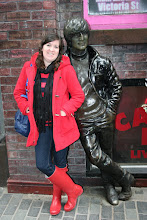On the morning of 7 May, the UK woke up to a hung parliament. Since I was unable to vote – or, as I later learned, was able to but just missed registration – I went to bed mainly unbothered by whatever results would greet me the following day. I was aesthetically annoyed with Tory leader David Cameron, whose smug little face I could do with never seeing again, and already discouraged by my own liberal attitudes being disregarded back in conservative Canada. So you could say I am politically lackadaisical at the moment.
But from my point of view, it looks as if the mother country is following in the footsteps of its Commonwealth child. The UK has been continually disappointed by the Labour party (in power since 1997 when Tony Blair came in) in the same way that Canada was with the Paul Martin liberals. The comparisons are rather striking, actually, with MP scandals and older, crusty prime ministers who could just not connect with younger voters. The result for both has been – in a certain widespread cry of “out with the old and in with the new” – a movement to the left side: doughboy Stephen Harper and try-hard David Cameron. The two could be brothers, really. If only GW was still around to form a plonker triumvirate.
First of all (though all Canadians should know this well), what exactly is a hung parliament? It is a term used to describe a parliament in which no political party has an absolute majority of seats. In countries like Germany and Ireland, where legislatures have proportional representation, this is a common situation. In Canada, our current parliament is hung, as were the two before it. However, we don’t use the term across the pond. Back home we say minority government or minority parliament instead. Our 40th, 39th and 38th parliament were also not “hung” in the sense that there were no clear precedents allowing the leader of the party with the most seats to form a government.
A hung parliament inevitably leads to an uncertain period following election. For example, the widespread “d’uh” that was heard around the UK yesterday. This is apparently quite common in countries that are not used to it. Despite some confusion around overcrowded polling stations, the Tories are expected to get 305 seats (just short of the 326 needed for an outright majority), Labour is expected to end up with 255 and the Lib Dems (the UK’s NDP essentially) will have a disappointing 57.
According to the BBC, past practice under Britain’s unwritten constitution grants the sitting prime minister in a hung parliament with the right to make the first attempt at forming a ruling coalition. But apparently, the Queen is the only person who can actually invite someone to form a government and become prime minister. She has no tie-breaking power, however, so the ceremony is mainly symbolic. If the outcome of the election is inconclusive, as it is today, it is for the political parties to determine who will become prime minister, and then that decision is communicated to Buckingham Palace.
Meanwhile, back in the ring, the gloves are coming off – not that things didn’t get dirty during the run up to election night. Yesterday morning, the leaders’ rhetoric is mature and edifying. Tory Cameron has accused Labour PM Gordon Brown with “losing his mandate to govern” but Gordo came back with a statement that as prime minister he still has “a constitutional duty to seek to resolve the situation for the good of the country.” In the meantime, Lib-Dem leader Nick Clegg, who created early positive buzz during the three pre-election televised debates, said that the result gives the Tories the right to seek to govern first.
As I post this, the situation has still not been resolved. The government of the UK is still hanging in the balance. Cameron has offered an olive branch to the Lib-Dems, effectively inviting them to join forces and create a “stronger, more stable, more collaborative government.” Former Tory prime minister John Major told the BBC that offering cabinet seats to the Lib Dems was “a price, in the national interest, that I personally would be prepared to bear” for the formation of a stable government able to manage the economic crisis.
No one has moved out or into Number 10 just yet, but it is likely that sometime this weekend, the change will come. Prime minister Brown will probably pack up and head out to Buckingham Palace with Cameron in his stead. When the motorcades arrive, Elizabeth II will invite someone to form a government. And then it will be interesting to watch the political drama unfold. Living in the UK during this historic election (these televised debates were the very first of their kind over here) has been exciting, even if I am not that invested in the result.
Saturday, 8 May 2010
Subscribe to:
Post Comments (Atom)


No comments:
Post a Comment